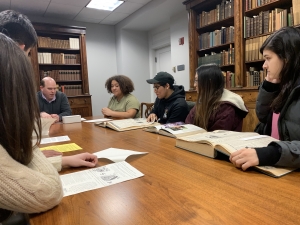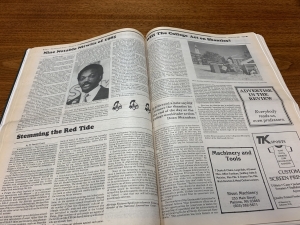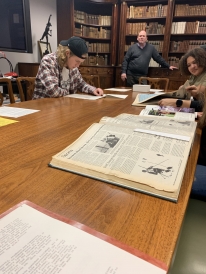
The Archives of Dartmouth
When you visit Dartmouth, one of the many places you should visit are the archives at Rauner Library. Though it may escape notice because it is right next to Dartmouth's main library Baker-Berry, Rauner is a hidden gem that holds many of the College's secrets.
Currently, I am participating in a program called Foundations through Dartmouth's Center for Social Impact. A two-term program for freshmen, Foundations aims to teach students what working for the social good can look like in the winter and gives them the opportunity to do a consulting project with a local non-profit in the spring. We visited Jones Media Center and Rauner Library to learn about how information and the distribution of knowledge can shape the way we interact with the complicated history of Dartmouth.

Rauner has records of everything a person could ever imagine. Communication between college officials, old Dartmouth newspapers from all three main outlets (the Dartmouth, Dartmouth Review, and Alumni Magazine), Aegis yearbooks, and profiles on every alumnus and alumna are held in Rauner, as are things such as photographs, written documents and plays, and flyers. While I was there, I looked at files the College had collected during the apartheid revolts in the '80s. During this time, Dartmouth was still investing in companies who had ties to South Africa while other colleges had already divested and denounced the Sullivan Principles.
Students built shanties on the Green, wrote plays, and wore green armbands at graduation in '83 to protest Dartmouth's outdated ways. The Dartmouth and the Dartmouth Review wrote their own accounts of what was happening at the time, complete with ads for an Asian buffet at only $4.99! Rauner even had a piece of a shanty house that was built at the time. It was so amazing to see these pieces of history and learn about Dartmouth's past through primary documents.

As one of the nation's oldest colleges, Dartmouth has been through quite a lot and it is so fascinating to see how people at the school responded to political movements and times of upheaval. Additionally, Special Collections Librarian Morgan Swan noted that all the historical artifacts we still have today are just one small representation of the whole as people in power regularly made decisions on what was worth saving and even what things they didn't want to be remembered. The power of language and history impacts us today in the way we understand our legacy and look to the future, so I highly recommend everyone to visit.

















